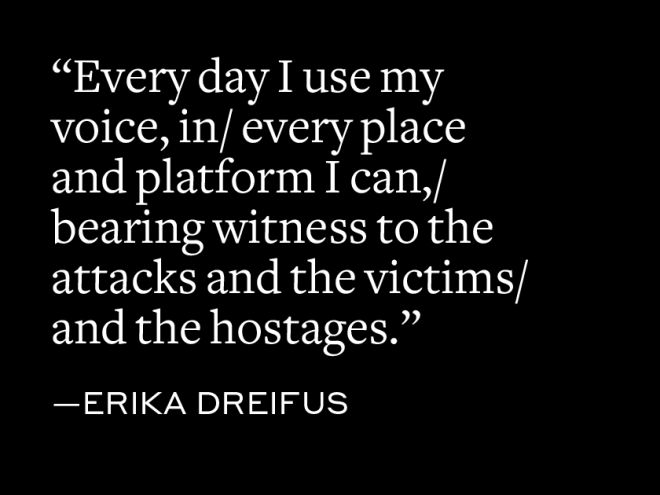
This piece is one of an ongoing series that we are sharing from Israeli authors and authors in Israel.
It is critical to understand history not just through the books that will be written later, but also through the first-hand testimonies and real-time accounting of events as they occur. At Jewish Book Council, we understand the value of these written testimonials and of sharing these individual experiences. It’s more important now than ever to give space to these voices and narratives.
In collaboration with the Jewish Book Council, JBI is recording writers’ first-hand accounts, as shared with and published by JBC, to increase the accessibility of these accounts for individuals who are blind, have low vision or are print disabled.

Translator Note
Kislev is the Hebrew month corresponding approximately to December. During Kislev the portions of the Torah relating the stories of the Hebrew Patriarchs who spent their days in the Mount Hebron region are read in synagogue. The poet, who lives in this region as well, sees the image of the Patriarchs in his Arab neighbors.
The 19th of Kislev is celebrated in Hassidic circles as the Festival of the Liberation of the Hassidic Master Rabbi Shneur Zalman of Liadi from prison. He was incarcerated for fifty-three days after being falsely accused of treason. It is also the anniversary of the death of the poet and Rabbi Moshe Zvi Neriah, who would wake his students in the morning (Eliaz Cohen among them) with the “Yidelach” song.
The views and opinions expressed above are those of the author, based on their observations and experiences.
Support the work of Jewish Book Council and become a member today.
Eliaz Cohen is a poet, editor, and peace activist. Born in 1972 to a pluralistic religious family, he was named after his uncle, Eliezer Feldman, who was killed in the Sinai Campaign of 1956.
In 1979 the family moved to Elkana in Samaria, where Eliaz grew up. The fact of his being part of a bereaved family and his neijboring to Palestinian villages influenced his world and finds expression in his work.
Cohen studied in the Bnei-Akiva Yeshivot, and served in the armored division of the army.
In 1994 he began to publish his writings in various magazines and newspapers, starting with prose writings which were followed by poetry.
He is an editor of the Mashiv Haru’ach journal of poetry, and author of six published collections of poetry. In addition, a bilingual edition (Hebrew-English) of his poetry was published in 2010 by Toby Press, and a collection from his poetry translated to French by Levant publishing house.
Cohen was the recipient of the Prime Minister Award for literature in 2006 and 2023.
In recent years he has stood out as a social activist dealing with such issues as religion and state, narrowing socioeconomic gaps, and the sanctity of life. During 2009 he was one of founders of Yerushalom, a movement for dialogue and peace between Palastinians and Israeli Settlers, thet led to the founding of Roots center in 2014. another initiatives that Cohen is leading are Light Tag-against the Jewish vandalism and hate attacks that under the name Price Tag, and the new peace initiative “A land for all — 2 States, 1 Homeland.”
Larry Barak was born in Chicago in 1942 to Russian immigrant parents with Hasidic roots. As a student of English at Roosevelt University, he won first prize for poetry in the Charles F. McElroy Literary Contest. After receiving his B.A., he continued his poetry studies in the M.A. program of the Graduate School of the University of Illinois at Chicago Circle.
In 1969, Barak moved to Israel with his wife, settling in Kibbutz Lavi where he has been living ever since. His prize-winning poem in the Ruben Rose Poetry Contest led to his joining the Voices group of Israeli poets writing in English.
As well as writing poetry in both Hebrew and English, he is also an accomplished poetry translator, his translations appearing in various literary publications.



